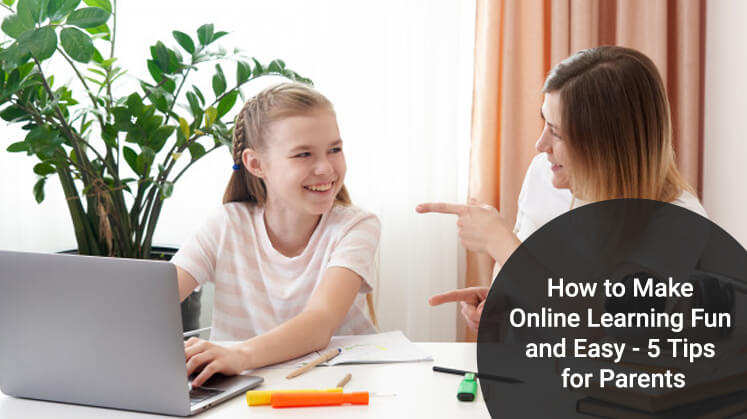
“Shock and awe” would perhaps best describe the emotional state parents find themselves in when locked up at home with their young ones for months on end. For as long as schools took care of schedules and imposed ground rules of conduct for the most part of the year (and the day), parents could handle the odd holiday months of carefree down-time that children got… indeed earned. But online education is a different animal altogether! If teachers are overwhelmed by the magnitude of the “remote learning project” and the pace at which they have had to “rise to the occasion”, parents have their own grouses with e-learning. The few tech-savvy parents may be doing a tad better when it comes to supporting their young e-learners. However, for the vast majority, remote education is no piece of cake.
Issues cited by parents range from frequent technical glitches to high levels of distractibility of their kids. But remote education need not be all drudgery. There are ways to make it fun and easy. I have some tips and online learning facts here that should help parents relax a little and ride it out through this patch with energy and enthusiasm:
Cut yourself some slack
What applies to parents in general also applies to parents supporting their kids through remote learning. You don’t have to be perfect. You don’t even have to be tech-savvy (although it would do you no harm if you were!). You don’t have to be an ace at Math or speak impeccable English. You just have to be YOU. Your support can take many forms. You could help your child organize his or her learning space. You could cut out the distractions, ensure that the child has the material he needs (pen, notebook, a steady WiFi connection, text books, etc.) is well nourished and decently dressed for an online class. And if you discover that you know less than your kids about e-learning platforms and trigonometry, you could learn with them or from them or help them break down their lesson into micro-lessons.
Most virtual learning activities are not very different from physical classroom activities. You can pitch in with your talents and strengths to support your child – and remember, in the words of Richard Carlson, author of ‘Don’t Sweat the Small Stuff’, “Choose being kind over being right and you'll be right every time.” So do be kind to yourself.
Cut your kids some slack
If you want your kids to thrive, take care of their emotions first. Children who are disturbed, pressured, tense, anxious about not meeting high expectations or being less than their peers are not happy learners. My second tip on how to make virtual learning fun would definitely be this one: learn to let go and give children the space to make mistakes. While grades do matter, instead of insisting on great scores, I would suggest you encourage your child to become an independent learner and a responsible citizen of cyberspace. Encourage him to hone his capacity for self-direction, for making safe and wise choices, for critical thinking. By learning to depend on his intrinsic motivation instead of external pressures and rewards, he can become a lifelong learner – and have fun doing so.
Reach out to the teacher
If your school has a good parent-teacher-school communication app, this would be the time to use this channel optimally to engage with the teacher and make suggestions or clear doubts or brainstorm about how to help your child do better. I was personally delighted to discover that my child’s school teachers and those in charge of the school management system were open to implementing some of the online learning ideas I suggested via email. For instance, I am convinced most academic content can be taught through out-of-the-box online learning fun activities such as doodling remotely and then sharing artwork, writing book or movie reviews to improve creative writing skills, doing a Power Point presentation collaboratively, storyboarding, starting an online debating society, or a book swapping club, or whatever else your school erp software permits.
Encourage positive peer to peer connections
Children love going to school, whether online or brick-and-mortar, when they experience a sense of connectedness with others their age. The give and take, the sharing of thoughts, ideas, opinions and notes, the socialization, the empathy and the warmth, the partaking of meals together, the fun and games and laughter and tears – this is what traditional schools offer, and this is what makes schools tick. It would be a mistake to expect children to be happy with less than the usual camaraderie.
The fun and games and empathy and warmth can all be reconstructed online when children are given a little space and liberty to communicate with their peers. Your role as a parent, when you see your child reaching out to peers, would be to encourage it. The connections could be further strengthened via collaborative remote learning activities such as gamification, documentary or artwork creation, etc.
Set Limits
What do limits have to do with making online study fun and easy? Everything! Remember, you cannot accelerate without brakes. Children are far more vulnerable to the e-goodies internet throws up – video games, chat sessions with friends, movies, songs, YouTube and more. Some of this could be distinctly harmful. To avoid retribution in future, you could protect your child now. Try and create a schedule that is as close as possible to the school schedule. Limit screen time. Place the monitor in a central location at your home so you can keep checking on what the child is doing.
Deep down, your child will feel more secure in the online space you have created for him. He knows you won’t let him go too far, that you care. This security will give him confidence and help him concentrate better on his assignments. He now knows that you are okay with game based learning, videos that showcase his talent without compromising on his safety or dignity, or collaborating with friends to create a fantastic PPT. The structure you give your child should not stunt his growth; just help him become a lifelong learner.
To conclude, I would like to quote Dr Benjamin Spock, pediatrician and author, who, in his classic book on childcare states: “In automobile terms, the child supplies the power but the parents have to do the steering.”
Steer well, so your child does not go adrift and enjoys the ride.
Recent
- NEP 2020 & College Autonomy: Complete Guide
- ICT For Higher Education - Smart Move Towards Online Teaching And Learning
- Online Examination Software For Post-Exam Analysis, Better Learning Outcomes & Decision Making
- The Best School Management System To Enhance Students Learning Experience
- Complete Guide To Learning Outcome Based Curriculum Framework (LOCF) - Part 1
- How To Manage Exam Schemes, Rules & Result Processing Online
- How To Manage College Applications, Merit List Generation & Online Admissions
- Complete Guide To The National Board Of Accreditation (NBA Accreditation)
- The Ultimate Checklist To Safeguard Your University’s Data
- Top 3 Reasons Why Higher Education Institutions Should Focus On Achieving Autonomy
- The Beginner’s Guide To Outcome Based Education Process (Part 2)
- Tips to Gear up Your Children To Return Back to School after Lockdown
- National Education Policy: All You Need to Know about NEP 2020 for Schools – Part 1
- Why Educators Need to Put Maslow Before Bloom
- Five Things You Should Know About Remote Learning as an Educator
- What is e-learning?
- Top Advantages of Online Assessment Tools
- What Is The NBA And Why Does It Matter?
- How Can Colleges Be Prepared for NAAC Peer Team Visit?
- ICT for Higher Education - Smart Move towards Online Teaching and Learning
- How to implement Choice Based Credit System?
- Why Online Fee Collection Software is a Must for Educational Institutions


